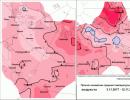Types of subordinate clauses in CSP table. Types of complex sentences. What type of SPP is: This is a book that Tatyana Nikolaevna recommended to me
Types of complex sentences
According to the meaning and structure, NGNs are divided into three main groups. The clauses in these complex sentences correspond to three groups of secondary members of the sentence: definitions, additions and circumstances *.
| 1. Definitive (including pronouns) | What questions are answered? whose? Who exactly? What exactly? and refer to the noun or pronoun in the main part; join most often with the help of allied words which, which, whose, where etc. and unions what, to, as if and etc. | The native places where I grew up will forever remain in my heart; He who does nothing will achieve nothing; She looked with such a look that everyone fell silent. |
| 2. Explanatory | They answer questions of indirect cases and usually refer to the predicate in the main part; join with alliances what, what, if, if, if etc. and allied words where, where, how much, which and etc. | I soon realized that I was lost; It seemed to him that everyone around him rejoiced at his happiness. |
| 3. Circumstantial: | ||
| mode of action, measure and degree | Answer questions how? how? to what extent? in what degree? how much? and usually refer to one word in the main clause; join with alliances what, to, as if, exactly and allied words how, how much, how much. | We were so tired that we couldn't go any further. |
| time | Answer questions when? From what time? until what time? how long? and usually refer to the entire main sentence; join with alliances when, while, as, while, as long as, while, as long as, after, barely, since, just, a little, before, as soon as, just, just, just, just, just a little, before, before. | Until the rain stops, we will have to stay at home. |
| places | Answer questions where? Where? where? and usually refer to the entire main sentence; join with allied words where, where, from where. | People go to folklore practice where folk traditions of song and tale are still alive. |
| goals | Answer questions why? for what purpose? and usually refer to the entire main sentence; join with alliances so that, in order to, so that, so that, so that, if only, yes, if only. | In order not to get lost, we went to the path. |
| causes | Answering questions why? from what? for what reason? and usually refer to the entire main sentence; join with alliances because, because, due to the fact that, due to the fact that, due to the fact that, due to the fact that, then that, since, for, good, because, due to the fact that, especially since. | Because the candle burned weakly, the room was almost dark. |
| conditions | Answer the question under what condition? and usually refer to the entire main sentence; join with alliances if, if, when, if, if, how, once, how soon, whether ... whether. | If the weather does not improve within a day, the trip will have to be rescheduled. |
| concessions | Answer questions no matter what? contrary to what? and usually refer to the entire main sentence; join with alliances although, despite the fact that, despite the fact that, let and combinations of pronominal words with the particle neither no matter where, no matter how much, no matter where. | Despite the fact that it was already well after midnight, the guests did not disperse; No matter how the tree rots, it keeps growing. |
| comparisons | Answer questions like what? like who? than what? than who? and usually refer to the entire main sentence; join with alliances as, as, as, as, as if, exactly, as if, as if, as if. | Birch branches stretch towards the sun, as if stretching out their hands to it. |
| consequences | Answer questions about why what happened? what follows from this? and usually refer to the entire main sentence; join with union So. | The summer was not very hot, so the mushroom harvest should be good. |
Subordinate explanatory clauses can be attached to the main clause with a particle whether used in the meaning of the union. For example: He didn't know if tomorrow would come. union-particle whether can serve to convey an indirect question: They asked if we would go with them.
REMEMBER: main for determining the type subordinate clauses is a semantic issue. Conjunctions and allied words can add additional shades of meaning to NGN. For example: The village where Eugene missed was a lovely corner. This is a complex sentence with an attributive clause, which has an additional spatial connotation of meaning.
Types of subordinate clauses in Russian are distinguished depending on the semantic relationships between the parts complex sentence. But first you need to figure out what the complex sentence (or CSP) itself is, and how it differs from the complex sentence (CSP) of its fellow.
Their main difference lies in the form of connection that determines the relationship between the parts of these types of complex sentences. If in SSP we are dealing with a composing connection (as you might guess, based on one name), then in NSP we are dealing with a subordinating one. 
writing connection presupposes the original "equality" between the parts, i.e. each separate predicative unit (a simple sentence as part of a complex one) can function separately without losing its meaning: The gentle May sun shone amiably and clearly, and each twig stretched towards it with its still young leaves.
It is easy to guess that the parts of the sentence in NGN are in a different kind of relationship. The main clause in it "governs" the subordinate clause. Depending on how this very control takes place, there are the following types of subordinate clauses:
Types of subordinate clauses | Values | Questions | Unions, allied words | Proposal Sample |
|
defining | Define a noun in a main clause | Who, what, where, where, from where, which, which | I accidentally stumbled upon a letter (what?) that was written long before I was born. |
||
Explanatory | related to verbs | Case questions | What, to, how, as if, etc. | I still don't understand (what exactly?) how this could happen. |
|
circumstantial | Point to the place of action | Where? Where? Where? | Where, from where, where | He went to (where?) where flowers bloom all year round. |
|
Indicate the duration of the action | When? How long? Since when? Until what time? | When, as soon as, since then, etc. | I realized it then (when?), when it was already too late. |
||
Under what condition? | If, if...then | I will help you solve the problem (under what condition?), if I have time. |
|||
Specify the reason for the action | For what reason? Why? | Because, since, because, for | Petya could not answer the question (for what reason?), because he was not ready for it. |
||
Indicates the purpose for which an action is being performed | For what? For what? For what purpose? | To personally verify this, he personally came to the director (why?). |
|||
consequences | Show us the result of an action | As a result of what? | She looked so chic that she couldn't take her eyes off her. |
||
course of action | How? How? | Like, like, exactly, like, like | The boys rushed so (how?), As if a pack of hungry dogs were chasing them. |
||
measures and degrees | In what degree? To what extent? To what extent? | How much, how much, what, how | Everything happened so fast (to what extent?) that no one had time to come to their senses. |
||
comparisons | Like who? Like what? Than who? Than what? | Like, like, like, than | This guy turned out to be much smarter (than who?) than his peers. |
||
Despite what? | Though, in spite of, for nothing, no matter how much ... no, let | It may seem untrue, but I believe in it (despite what?). |
|||
In order to more accurately determine the types of subordinate clauses, it is enough just to correctly ask a question from the main sentence (or a word in it) to the dependent (subordinate).
), there are four main types of subordinate clauses:
- defining,
- explanatory,
- circumstantial (mode of action and degree, place, time, conditions, causes, goals, comparisons, concessions, consequences),
- connecting.
Clauses
Refers to a noun or pronoun. Answer questions about definitions Which? which? which?).
Join with allied words: which, which, whose, what, where, when, from where, etc.
As well as unions: so that, as, as, exactly, as if, etc.
Examples
- [Alarm clock rang]. Alarm Which?(which was given to me by my grandmother). [Alarm clock rang( that my grandmother gave me)].
- [The house burned to the ground]. House Which?(Where I was born). [House( where I was born) burned to the ground].
- [A.S. Pushkin erected more than one monument]. A.S. Pushkin what?(Whose contribution to the development of Russian literature can hardly be overestimated). [A.S. Pushkin( , whose contribution to the development of Russian literature is difficult to overestimate,) erected more than one monument].
- [That day my life changed]. In a day Which?(When I understood everything). [In that day( when I understood everything) my life has changed].
Clauses of explanatory
Relate to the verb. Answering case questions Who? What? to whom? what? whom? what? by whom? how? etc.).
Join with allied words: who, what, which, whose, where, where, from where, how, why, why, how much
As well as unions: what, to, as if, as, as if, as if, etc.
Examples
Here the main clause is in square brackets, and the subordinate clause is in round brackets.
- [I'm sure]. Sure in what?(Because the Earth is spherical). [I'm pretty sure that the earth is spherical)].
- [He found out]. found out What?(How many days have passed since the launch of the first satellite). [He found out( how many days have passed since the launch of the first satellite)].
- [They understood]. Understood What?(Why did I do it). [They understood( why did i do it)].
Adverbial clauses
Play the role of common circumstances. Answer detailed questions. Like ordinary circumstances, they are divided into several types:
| Type of subordinate clause | Questions it answers | Linking with unions | Linking with allied words | Examples |
|---|---|---|---|---|
| mode of action | How? how? | like, what, to, as if, exactly |
|
|
| Measures and degrees | how much? in what degree? | what how | how much, how much |
|
| Places | Where? Where? where? | where, where, from where |
|
|
| time | When? how long? since when? How long? | when, while, as long as, as soon as, as long as, until |
|
|
| Goals | For what? for what purpose? | to (to) |
|
|
| Causes | Why? from what? | because, because, since, for |
|
|
| Conditions | under what condition? | if, when, time |
|
|
| concessions | in spite of what? | although, despite the fact that, let, let | no matter how much, no matter how |
|
| Consequences | And..? hence..? | So |
|
|
| Comparative | How? | as, as if, as if |
|
Adventitious connecting
Relate to the entire main body.
Join with allied words: what, where, where, where, when, how, why
Supplement and explain the content of the main part. Often they have the meaning of a consequence.
Examples
- He was worried and therefore failed to pass the exam.).
- My brother never opened the book all this time that haunted me).
see also
Notes
Links
- // Encyclopedic Dictionary of Brockhaus and Efron: In 86 volumes (82 volumes and 4 additional). - St. Petersburg. , 1890-1907.
- Main sentence - Dictionary of literary terms
Wikimedia Foundation. 2010 .
See what a "subordinate clause" is in other dictionaries:
Subordinate clause- SUBORDINATE CLAUSE. See main sentence... Dictionary of literary terms
ADDITION, weaving, m. Ozhegov's Explanatory Dictionary. S.I. Ozhegov, N.Yu. Shvedova. 1949 1992 ... Explanatory dictionary of Ozhegov
Syntactically dependent predicative part of a complex sentence containing subordinating union or allied word. Vladimir saw with horror that he drove into an unfamiliar forest (Pushkin). Describe the feeling that I experienced at that time, ... ...
The dependent part of a complex sentence containing a union or allied word. Refers to the entire main clause or to one word in it (additional, attributive clauses). F. I. Buslaev laid the foundation for ... ... Literary Encyclopedia
- (gram.). This is the name, in contrast to the main one, of such a sentence that does not have an independent, integral meaning without the main sentence. The syntactic structure of all Indo-European languages clearly shows that the creation of the category P ... Encyclopedic Dictionary F.A. Brockhaus and I.A. Efron
subordinate clause- lingu. Part of a complex sentence, syntactically subordinate to the main part (main clause) and connected with it by a union or allied word. Second sentence of reason. Conditional first sentence ... Dictionary of many expressions
subordinate clause- See main sentence... Grammar Dictionary: Grammar and linguistic terms
SUBORDINATE CLAUSE- (subsequent item, German Nachsatz), this is the name, by analogy with the terminology of grammar, the second part of the musical period, corresponding to its first part, which is called the main (previous) sentence and ends for the most part ... ... Music dictionary Riemann
A subordinate clause that answers the question what? and referring to the member of the main sentence, expressed by a noun or a substantiated word. Subordinate attributive clauses are attached to the main clause with the help of ... ... Dictionary of linguistic terms
A subordinate clause that answers any case question and refers to a member of the main clause that needs semantic expansion: without a subordinate clause, the main would be structurally and semantically incomplete. Adjunctive ... ... Dictionary of linguistic terms
Subordinate explanatory clauses answer questions of indirect cases. The main part needs a semantic explanation, the main part without a subordinate clause looks unfinished.
Examples: Still, I don't think you have the right to do so. (it seems that?)
Clauses
Definitive clauses answer the question which one?; placed not from the main part, but from the noun. In an explanatory clause, there is always the word "which" or a word that can be replaced by it.
Examples: She hummed motives that moved to tears. (What are the motives?)
Adverbial clause
The adverbial clause answers the questions of adverbs. Since there are many questions of adverbs, we divide the adverbial clauses into subtypes:
The subordinate purpose answers the question "for what purpose?". In the subordinate goal there is always the word "to"
Examples: To come soon New Year, we moved the hands of the clock forward.
An adjunctive concession. In the subordinate concession there is always the union “although” or another union synonym (despite the fact that, whatever, no matter how ...)
Examples: The prince has a stupid face, although many considered him a dull person.
Adventitious corollary. In the subordinate clause there is always the union "so". A comma must be placed before so.
Examples: The boat had no oars, so we had to row with a board.
Adventitious reasons. In the subordinate cause there is always the union "because" or its synonym (because, from the fact that)
Adjunctive conditions. There is an “if” union, but sometimes the “when” union can play the role of the “if” union.
Examples: If I had known all the consequences, I would not have climbed into the water.
Adventitious mode of action. Answers the question "how?", indicates the method of action.
Examples: He ate as if he had not eaten for three days.
Measures and degrees.
Examples: It was so dark that I couldn't see anything.
Adventitious comparison.
Examples: The air trembled from time to time, as disturbed water trembles.
Time adjunct. There is always the question "when?"
Examples: When I woke up, it was already dawn.
Adventitious place. Answers the questions “Where? Where? where?"
REMEMBER: the main question for determining the type of subordinate clauses is the semantic question.
Unions and allied words can add additional shades of meaning to a complex sentence.
Example: The village where Eugene missed was a lovely corner. — This is a complex sentence with an attributive clause, which has an additional spatial connotation of meaning.
In Russian, a group is distinguished complex sentences, the subordinate parts of which can not be called either attributive, or explanatory, or adverbial. These are complex sentences with subordinate clauses.
Such subordinate clauses contain an additional, incidental, additional message to the content of the main part of the complex sentence. In this sense, such subordinate clauses often come close in meaning to plug-in constructions.
The means of communication in them are allied words what, why, why, why, as a result of which, etc., which, as it were, repeat the content of the main part in a generalized form.
For example: His enemies, his friends, which may be the same thing, he was honored this way and that. (A. Pushkin) The coachman took it into his head to go by the river, which was supposed to shorten the naga's path by three miles. (A. Pushkin)
It is impossible to raise a question to the connecting clauses, since in the main part of the complex sentence there is no word, phrases that would require the presence of a subordinate clause.
Algorithm for determining the type of subordinate clause
1). Determine main part complex sentence.
2). Determine the key word in the main part (if any).
3). Ask a question from the main part to the subordinate clause:
- from the content of the main part as a whole;
- from the predicate in the main part;
- from a noun or pronoun in the main part;
- it is impossible to ask a question to the subordinate clause (with joining and comparative).
4). Indicate the means of communication in the subordinate clause (unions or allied words).
Which deals with the study of two units: sentences and phrases.
This article will focus on the syntax of the sentence. First, we will find out what the concept of a sentence as a whole implies, and then we will tell in more detail about the types of subordinate clauses in Russian.
1. The concept of a sentence
Being one of the main ones, it is a set of one or more words, which, as a rule, consists of a question (then they are called interrogative), an incentive to action (incentives) and the transfer of certain information (narrative).
Everything is usually divided into compound (equal) and complex (these types of subordinate clauses are considered dependent. They are connected with the help of special unions or allied words).
2. How to correctly identify offers?
By their nature, these units of syntax are very, very diverse. In order to determine, you just need to remember four main signs:
ABOUT grammatical meaning;
About the question this sentence answers;
About the part of the proposal to which it can be attributed;
About means of communication.
It is on the basis of these features that syntactic units are divided into circumstantial, attributive, connective and circumstantial.
3. in Russian
1. Determinants. Role performed: characterize the attribute of the object.
The question the sentence answers is: what?
What they refer to in the sentence: to a noun.
Conjunctions and allied words: when, where, where, which, which, whose, what, which.
Other characteristic features: demonstrative words are used - any, each, anyone, such, that.
For example: The camera I bought in Chicago last year takes excellent pictures.
2. Explanatory. Role performed: consider in more detail and complement the meaning of the main sentence.
The question the sentence answers is: what?
What they refer to: a verb, an adjective, an adverb, a single phrase.
Unions and as if, so that, what, why, where, what for, when, where.
Other characteristic features: use of the demonstrative word "that".
For example: I know that I can do it.
3. Connecting. Role performed: contains an additional clarification message.
What they refer to: the entire main sentence.
Conjunctions and allied words: “why”, “what”, “why”.
4. Detailed types of subordinate clauses. The relative clauses of this type are quite diverse and therefore also have their own classification:
- mode of action and degree
Role performed: indicate the measure, degree and manner of action.
The question the proposal answers is: how? how much? in what degree? How?
What does it refer to: a verb or an adjective.
Conjunctions and allied words: “as if”, “to”, “what”, “as much”, “how much”, “how”.
Other characteristic features: demonstrative words - "such", "to such an extent", "as much", "as much", "so".
For example: He screamed so that he almost deafened those present.
- places
Role performed: designate the place of action.
The question these sentences answer is: where from? Where? Where?
What do they refer to: to the whole sentence or to the predicate.
Conjunctions and allied words: “from where”, “where”, “where”.
Other characteristic features: demonstrative words - "everywhere", "everywhere", "there", "there".
For example: Where the road ended, the field began.
- time
Role performed: indicates the duration of the action.
The question the proposal answers is: until when? When? since when? how long?
Conjunctions and allied words: “until”, “since”, “until”.
Other characteristic features: demonstrative words - "sometimes", "once", "always", "now", "then".
For example: While you were watching TV, I finished reading the newspaper.
- conditions
Role performed: indicate the condition under which the action is performed.
The question the sentence answers is: in what case? under what condition?
Conjunctions and allied words: “if”, “if”, “time”, “if”, “how”.
For example: If you remind me, I will bring you a book.
- causes
Role Performed: Indicates the cause.
The question the sentence answers is: for what reason? from what? Why? because of which?
What they refer to: to everything Ch. sentence or predicate.
Conjunctions and allied words: "because", "because", "because".
For example: He went on foot, because. I did not want to ride in stuffy transport.
- comparisons
Role performed: provide an explanation by comparison.
The question the sentence answers is: like what?
What do they refer to in the sentence: to everything Ch. sentence or predicate.
Conjunctions and allied words: “as if”, “like”, “than”, “as if”.
For example: He preferred to be silent, like a fish.
Role performed: indicates the purpose of the action.
The question the proposal answers is: why? for what purpose? for what? For what?
What they refer to: to everything Ch. sentence or predicate.
Conjunctions and allied words: “in order to”, “then”, “then to”.
For example: I want to learn in order to know.
- concessions
Role Performed: The circumstance for performing the action.
The question the sentence answers is: in spite of what? contrary to what?
What do they refer to: to the entire main sentence or to the predicate.
Unions and allied words: “no matter what”, “despite the fact that”, “what”, “although”, “let”, “no matter how”, “whenever”, “no matter how much”
For example: Although it was cold, he was sweating.
- consequences
Role performed: means the consequences, result or conclusion.
The question the sentence answers is: what of it?
What they refer to: to everything Ch. offer.
Conjunctions and allied words: “so”, “therefore”.
For example: Despite the hunger, I will not eat it.






